#tribal synergies
Text
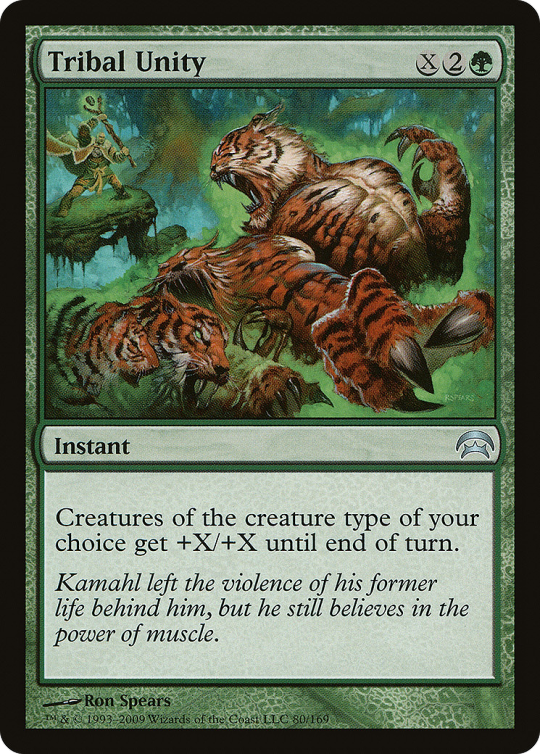
*cough, cough* I'm just going to leave this hear.
#mtg#magic the gathering#universes beyond#fallout#mutant menace#tribal synergy#perfect flavor#all those oversized super mutants#fantasy card game#wotc#wizards of the coast#hasbro#bethesda
5 notes
·
View notes
Text
*begins to work on a Shadowfax deck*
... more horses plz wotc
my children are dying
#magic the gathering#mtg#there are eighteen horses in rw total#and this is counting all the artifact creatures#and bill the pony#''but charles you can add-'' STOP THAT SENTENCE RIGHT NOW#IF I ADD PEGASI OR UNICORNS OR CHANGELINGS IT IS A *MORAL FAILING AND A COMPROMISE OF MY MOST DEEPLY HELD BELIEFS*#THAT BELIEF PRIMARILY BEING *YOU HAVE TO GO ALL IN ON TRIBAL DECKS OR YOU MAY NOT EVEN TRY*#IF THE COMMANDER SAYS X TRIBE GETS THIS BENEFIT *YOU JAM EVERY CREATURE THAT FITS INTO THAT DECK DANGIT*#TRIBAL SYNERGY OVER honestly making an effective deck BUT I DON'T HAVE THE BRAINPOWER TO GET ALL CLEVER WITH ''COMBOS'' OKAY
14 notes
·
View notes
Note
Do you have any idea how cool you are?
Well I was cool enough to make all these mutate cards
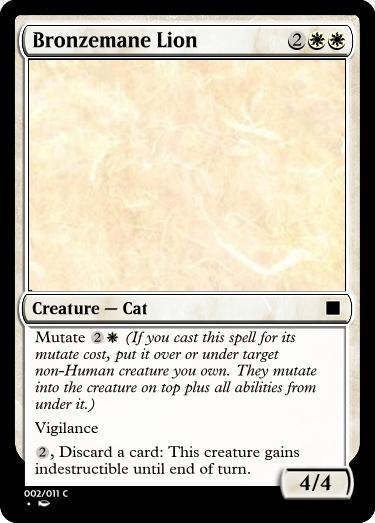
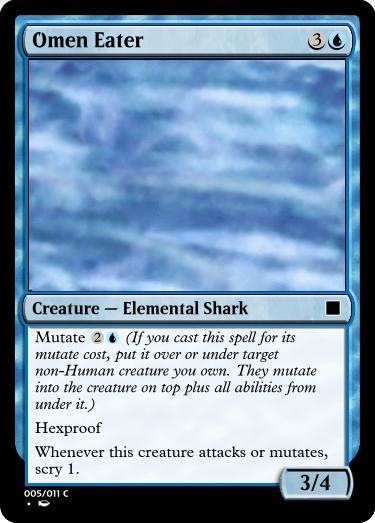
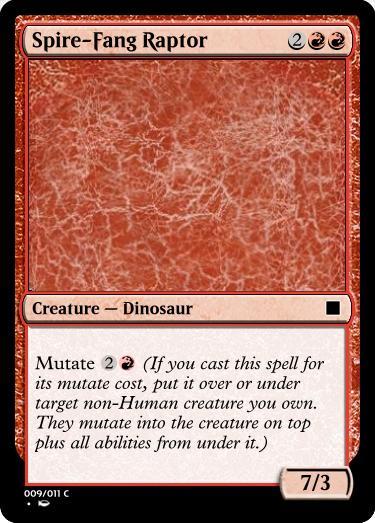
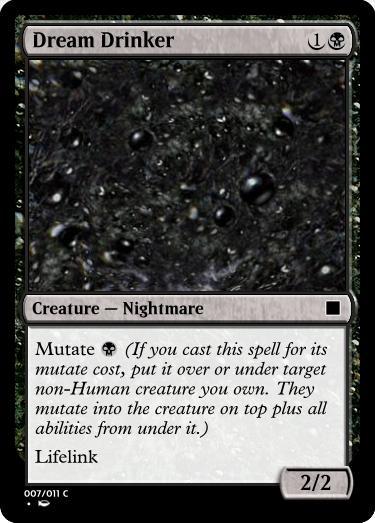
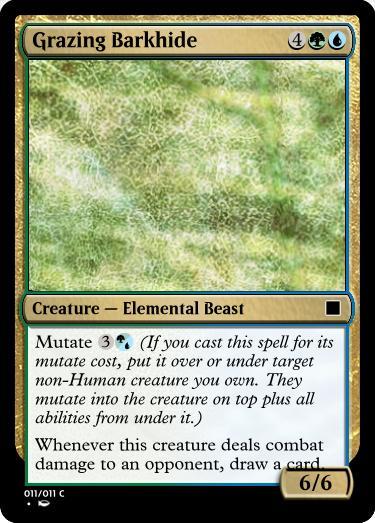
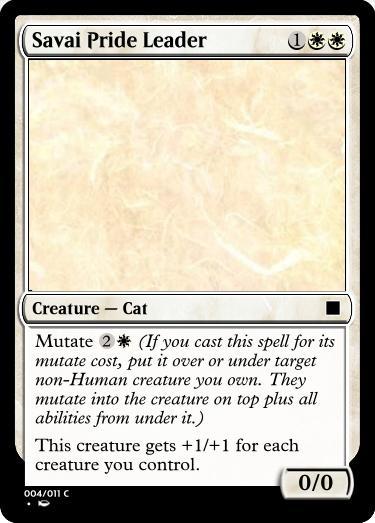


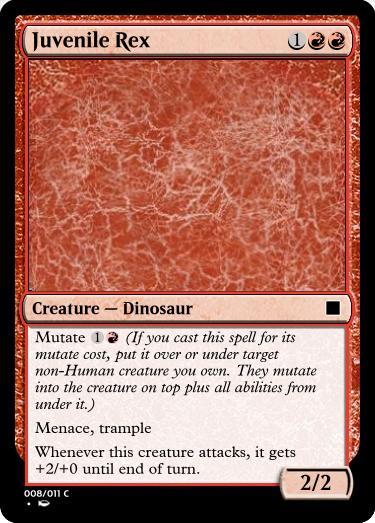
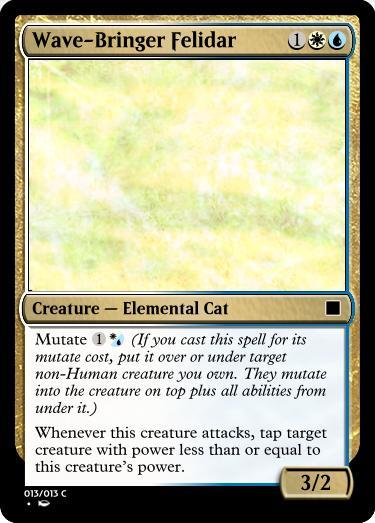
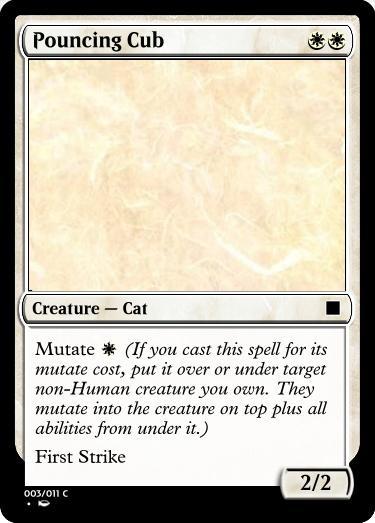
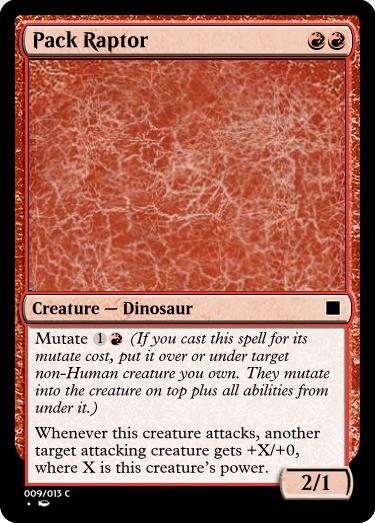
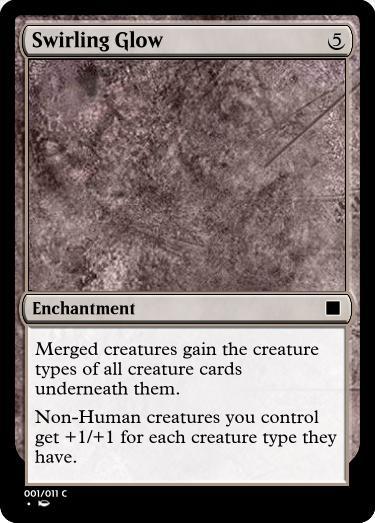
And who on Ikoria could possibly be responsible for this sudden surge of mutations?!
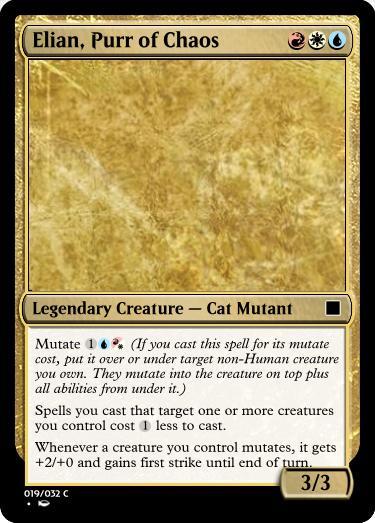
#asks#custom cards#just imagine a little kitty cat#flanked on either side by mutated monstrosities#anyway i never liked how ikoria's mutate cards mostly just used “when this creature mutates” triggers#combining abilities has so much potential!#so i made a bunch of simple mutate cards to give an easy way to mix abilities#along with some cards like spire-fang and barkhide that want some abilities to help them out#and some abilities like wave-bringer felidar that scale with power#there's so much more that can be done besides just “activate all your mutate triggers”#and of course elian helps out with casting no only mutates but any spells targeting your creatures#love getting that cross-elian synergy in#and swirling glow (not satisfied with that name but oh well) takes inspiration from Embiggen#and also elian test subject because stacking up tons of creature types is fun#btw i modified Elian Test Subject to always be able to choose mutant because running it in a mutant tribal deck is too perfect#also the main reason swirling glow says non-Human is the same reason embiggen says non-Brushwagg: Changeling
2 notes
·
View notes
Note
Is "kindred" not the new term for creature type-based synergies? I thought it was, while "typal" was broader and encompassed stuff like artifact synergies, sacrifice synergies, etc.
Kindred is the name of the card type that used to be Tribal.
Typal is a word referring to any strategies built around subtypes, types, or supertypes, usually creature types.
33 notes
·
View notes
Text
I no longer make YouTube vids discussing Lorcana news (no one watched them and they have zero rewatch value) so now I go to tumblr. We got a new set announcement! AZURITE SEA!

The vibe is PIRATES. So like Into the Inklands, but more so. No new mechanics revealed, though hopefully there will be something. We do have two new franchises, though! Big Hero 6:

and Rescue Rangers:

Neat! Okay let's get into the cards that may actually see any play.

This may see play in Amber/Amethyst aggro decks, which are already running the Bodyguard Donald with the same ability. The Bodyguard is very useful for protecting high-lore low-stat squishies, but having twice as much of that ability is very very nice.

As we'll see in a bit, this is the first time we're seeing any sort of "milling" (discarding cards from decks) in Lorcana. I like this because it synergizes with Chernabog. I'm wondering if we'll be seeing more cards that jive with this archetype.

We've seen two each of Chip and Dale, and if we get more of them, there might be enough synergy for a "tribal" deck. If that happens, you will definitely want this guy, he's got great stats for his cost, and he's inkable! Unlike last set's Moana.

Not the worst thing. She survives Brawl, which is important. But she's definitely not surviving a challenge. Most Amethyst decks are never going to have fewer than 3 cards in hand, though, they already have so many other card draw tools. Honestly the most likely spot for her might be Amber/Amethyst aggro - drop her turn 4, your opponent is going to be focused on your squishies, and you get to refill your hand on turn 5.

So this is a weird one. There is an existing Emerald/Steel deck that wants to play A Whole New World a lot of times, and technically that's "milling" in that it's forcing your opponent to lose by running out of cards to draw, but now this is actual milling. But... it's only one card. This is going to need a lot more support for this to actually see any play at all.

This seems really good, and a much better payoff than the uninkable Robin Hood from last set ended up being. This could net you a lot of lore, and might be the start of an Emerald burn deck.

Speaking of Emerald burn, this is one of the best 1-drops I've ever seen. I want to combo this with floodborn Kida and some sort of Reckless.

Lorcana has been real hesitant to do tutoring to hand, but even just ensuring you topdeck, say, Lucky Dime, could be very useful.

This just seems like a solid overall card, aside from the Brawl vulnerability. Will we finally see an Inventors deck?

This is amazing. Ruby/Sapphire self-damage/heal deck. This may finally work where Grand Pabbie just didn't.

The card is "okay" at best but I love the flavor/art lol

That is a pretty easy condition to meet, and they don't even need to be exerted. Just have this in an Alien and/or Robot deck and have it passively spit out lore for you, shunting in a new character every turn.

Saving the best for last - JIMBO! Wow, what a card. Immune to Madame Medusa, and can draw you potentially four cards??? I would love to see an Amber Pirates deck (there's already the Piglet), particularly if we can get a cost reducer to get Jim here out earlier.
Set comes out in November!
15 notes
·
View notes
Text
Yeah, this just lacks that sublime synergy spark that Are You Happy's tribal rhythms brought, but a fair combo nonetheless!
3 notes
·
View notes
Note
Everyone's been joking about how the new Atraxa can fish out Tribal cards since that's a card type too. That's not really what this is about, though. My question is, why do you think Tribal was never errata'd into a supertype? It does decidedly supertype-like things. Not to mention that there's no indication of what a Tribal card without another card type might look like. More than that, casting One With the Stars on Boggart Shenanigans makes it stop counting as a goblin for the purpose of other goblin synergy cards, even as One With the Stars can't remove supertypes like legendary.
Tribal was created to give non-creature spells creature types.
Creature types are subtypes.
Subtypes are exclusive to one or two types.
Supertypes are not types.
Supertypes don't/can't have associated subtypes.
Therefore, Tribal has to be a type and not a supertype for it to do what it was designed to do.
23 notes
·
View notes
Text
Krenko’s Guide to Creature Types: Noble
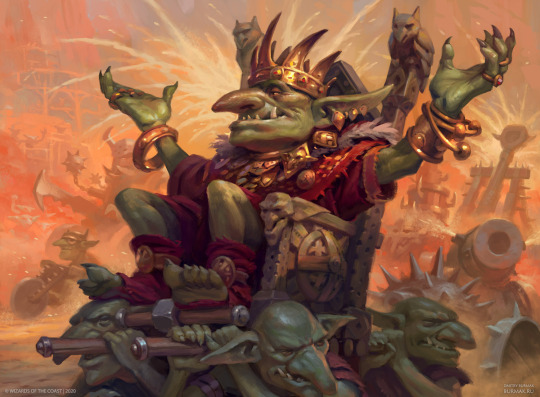
Art by Dmitry Burmak
What is a Noble (flavorfully)?
Nobles are the people in charge who don’t deserve to be. Though it’s not entirely consistent, the Noble type generally goes to leaders and members of the aristocracy who didn’t rise to the rank through combat prowess. If a character became a ruler through violence, they’re usually listed as their violent class instead.
What is a Noble (mechanically)?
Noble’s lack of tribal identity is heavily a symptom of a creature type being inconsistently erattad in. You can see just a hint of Nobles being support for your other creatures, but cards like Lord of Atlantis and Goblin King are inexplicably not Nobles. Thus, the Noble identity is entirely random. They appear in all five colors with all sorts of abilities, and while there’s a hint of supporting creatures, it’s not wide enough to matter.
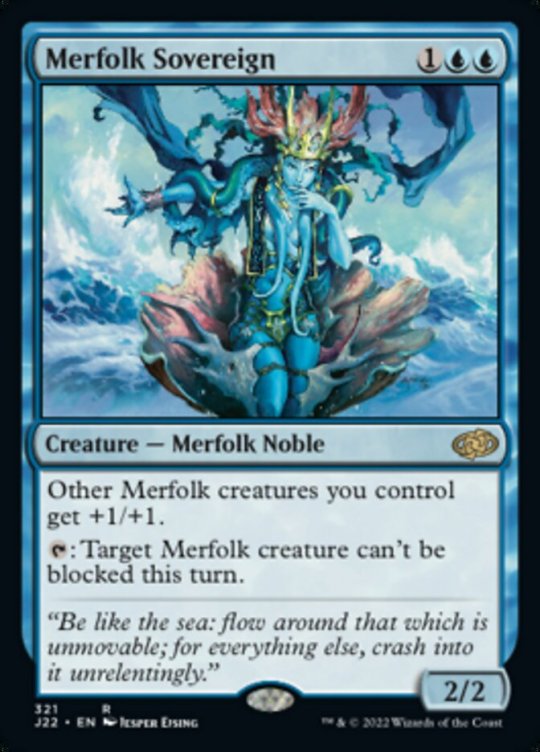
Merfolk Nobility includes Sovereigns, but not Masters, Lords, or Reejereys.
Can I make a Noble deck?
You can make a Vampire deck that’s full of Nobles. Nobles don’t have any shared mechanics overall or any real synergies, but there are well over a dozen Vampire Nobles, many of which are good enough to actually use. In theory, you could even use “choose a creature type” cards to add Noble support, but you’re just hobbling your Vampire deck if you do that. A third of all Nobles are Vampires, which isn’t that different from real life.
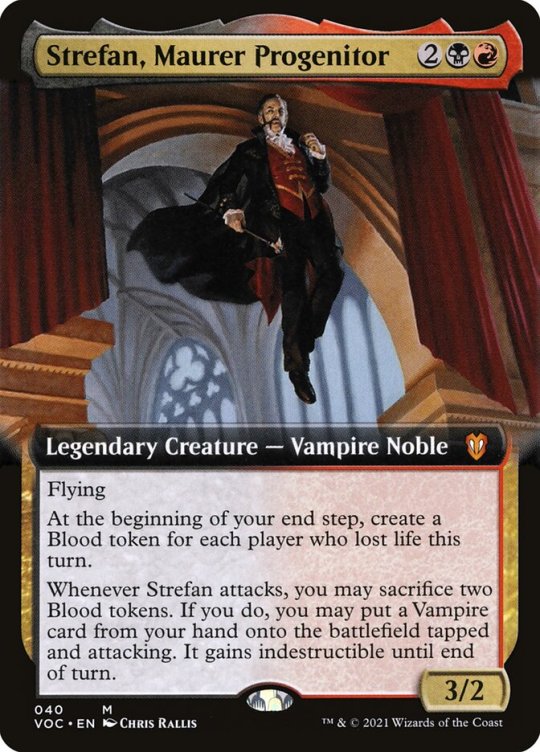
Is Noble a good creature type?
In the beginning, there was a creature type called Lord. Lord was a very clear and obvious creature type for people in charge, and almost universally went on creature cards that supported a tribe. Then they got rid of Lord, which was fine, because as a creature type it wasn’t doing anything.
But then they came out with Noble and erattad a lot of things to Noble, but while there’s some overlap between what a Noble is and what a Lord is, whether an individual creature is a Noble or not seems very strange and inconsistent. While I’m fine with the idea of Noble as a Class type (because what’s more of a Class than Noble?) the implementation is kind of a mess at the moment.
50 notes
·
View notes
Note
Okay LISTEN.
Morophon is a shitty excuse for a Tribal Commander who exists to make people who want to make Tribal decks for niche tribes (like me) shut up. (WUG fox Commander when?)
It's such a fucking bad design, with no actual Tribal synergies for 99% of tribes, it just exists to be Generic Tribal Commander. It's fucking Golos, Tireless Pilgrim but for Tribal decks.
It's a lazy, uninspired hack piece of design work that makes the Tribal Commander community worse by its very existence because now when I want to do a tribe without a good Commander, no matter the tribe, 80% of the community just says to use Morophon.
"I want to make WUBRG Angels so I can include all the Innistrad archangels-" "Use morophon"
"I want to make a deck based around the Elder Tribal-" "use morophon"
"I want to make a WUG fox deck to use my favourite foxes throughout the years-" "use morophon"
If you use Morophon the Brainless in any deck that isn't a changeling Tribal deck, I'm actively judging you.
Miss me with that fucking shit.
Here you go anon
27 notes
·
View notes
Text
Beyond Afrocentrism: Prerequisites for Somalia to lead African de-colonization and de-Westernization
What follows is the quasi-totality of my response to a Somali scholar, intellectual and activist, who happened to be a very good personal friend since the early 2010s and my days in Somalia. Being a perspicacious reader, my good friend, who originates from two different tribal backgrounds and has an unmatched knowledge of his great but recently (since 1991) beleaguered nation, noticed several recent articles of mine in which I call for a definite and irreversible replacement of the Anglo-French colonial rule in Africa with a genuine, secular African-Chinese-Indian-Russian alliance.

The Great Cat - Horus (Messiah) defeats the Ancient Serpent - Seth (Anti-Messiah); wall painting from the Tomb of Pashedu (TT3) in Deir el Medina (Luxor West)
Afrocentrism will be a total failure if it is thought to be just an African intellectual's thought, idea, theory or ideology. Theorizing is already part of Western intellectuals' falsehood and evildoing. Philosophy is nonsensical, absurd, false and inhuman. There was never 'philosophy' in Africa, because it would be viewed as deviation and decay. Contrarily, in Ancient Africa there were Truth, Transcendental Spirituality, Primordial Myth, World Conceptualization, Supratemporal Eschatology, and Spiritual-Material Synergy. So, the primary tasks of African Afrocentric intellectuals involve the irrevocable obliteration of all Western terms and their replacement with Oriental African concepts, notions, terms, values and virtues. Consequently, there cannot be "an Afrocentric University", because this term follows a Western pattern. Offering herewith an example, I suggest that every institution in which African students will learn the truth should be called after the Ancient Egyptian term "the Place of Truth" and the instructors "Servants in the Place of Truth". This title was associated at the time with all the great scholars specializing in mummification and in the preparation of the human soul for the Hereafter. However, this has always been the value of life, learning and knowledge according to all the varieties of African culture: material life is subject to moral judgments that enable us to gain eternal life.
Contents
Introduction
I. Decolonization and the failure of the Afrocentric Intelligentsia
II. Afrocentric African scholars should have been taken Egyptology back from the Western Orientalists and Africanists
III. Western Usurpation of African Heritage must be canceled.
IV. Afrocentrism had to encompass severe criticism and total rejection of the so-called Western Civilization
V. Afrocentrism as a form of African Isolationism drawing a line of separation between colonized nations in Africa and Asia
VI. General estimation of the human resources, the time, and the cost needed
VII. Decolonization means above all De-Anglicization and De-Francization
Introduction
Realizing what is at stake and being well acquainted with earlier African attempts for a final decolonization (notably the intellectual-academic sphere of Afrocentrism and the political activists of African Renaissance), my friend, who has the same age with me and who studied, lived, worked and prospered in the USSR, Canada, Yemen and Pakistan, wrote to ask me how Somalia could eventually contribute to or lead the African decolonization and de-Westernization movement, thus taking the Black Continent to the next stage and justifying the great expectations that were created across Africa back in 1960, due to the independence and the unification (of only two out of the five parts) of Somalia.
At this point, I have to add that the present response is only the first of three letters that I planned to send to my friend. The urgent need for worldwide decolonization and de-Westernization has become a major issue for great nations, organizations and alliances, like the BRICS+. Many people across the world would therefore question the entire conversation, stating that presently Somalia is too small, too weak, and too disunited in order to possibly undertake international tasks that seem to be best suited rather to some of the world's leading states.
I believe that, although this approach may be shared by many people, it is ostensibly very shallow. This is so because stronger a nation is, more difficult it becomes for their rulers, elites, and people to undertake an in-depth self-criticism, reassessment, and restart or partly rectification. In other words, a better organized nation is by definition more conservative and therefore less inclined to changes; these traits and conditions have been attested repeatedly throughout History.
Consequently, when it comes to colonization and Westernization, self-scrutiny must be very deep, and this -at the national level- can be extremely painful. That is why, in Russia, de-Westernization will be a far more difficult process to be carried out than in India.
Taken into consideration that Westernization (not only behavioral-cultural but mainly educational-academic-intellectual) is tantamount to alteration, corruption and degeneration, one has to underscore at this point that national identity is not necessarily proportionate to national independence. It is quite possible that an educationally-academically-intellectually corrupted nation, although in possession of an independent state, has minimal national consciousness (because of their entirely Westernized education), whereas an enslaved nation struggling to achieve national independence may have fully preserved their national identity and intellectual originality.
Back in January 2021, I explained exactly this to an Oromo friend, who wrote to ask me why Egypt does not help the Oromo liberation movements achieve national independence for Oromia and in the process demolish the obsolete and genocidal state of Abyssinia (Fake Ethiopia). Egypt is an independent state without national consciousness of historicity whereas the Oromos are a non-independent nation with emphatically strong Cushitic national identity and cultural originality. It took me a series of five articles to fully respond at the time; in the last article of the series, one can find titles of and links to the earlier parts:
I expand on these topics, because there is a multitude of parameters in the much needed effort of African decolonization and educational-academic-intellectual de-Westernization. To offer an example, I have to say that even the nefarious term "university" (from the Latin "universitas") cannot be possibly accepted by all those who -in Africa, Asia, Eastern Europe and Latin America- seek decolonization, de-Westernization, and restoration of the ancestral values, moral standards, cultural integrity, and academic-educational traditions. This is however discussed in a second letter dispatched to my friend. Last, in a third letter, I examine a number of major issues around which the refutation of the Western colonial forgery and pseudo-historical doctrine will have to revolve.
---------------------- Letter to a Somali friend -----------------------
Thank you for the opportunity you offer me to write down my observations, perceptions, reflections, and conclusions on the topic under discussion!
I. Decolonization and the failure of the Afrocentric Intelligentsia
Several educational, academic, intellectual and political efforts have been undertaken over the past six (6) decades in order to take Africa out of the disastrous and heavy, colonial impact and to help the various nations of the Black Continent achieve national identity, cultural integrity, and ultimate liberation from the Western yoke.
Explaining why the Afrocentric African intellectuals failed (or at least they did not meet the early enthusiastic expectations) necessitates an extremely lengthy treatise the size of an encyclopedia; however, at this moment, I have to pinpoint the crucial mistakes made by the leading figures of the movement that became known as Afrocentrism.
To offer beforehand a recapitulative judgment, I would say that they all viewed their tasks within a far narrower context, thus minimizing the extent of the work that lies ahead.
They did not realize the importance of inter-African concertation, reciprocal knowledge, and systematized cooperation.
They failed to evaluate the extent to which they all have been altered, Westernized, and alienated from their t=roots.
They did not examine how sick, absurd, criminal, and inhuman the Western world was - even before colonizing Africa and other parts of the world.
And they did not consider as their priority to contact other colonized nations in Asia, Eastern Europe, and Latin America, to exchange descriptions of common experience, and to decide about their much needed common struggle and decolonization effort.
II. Afrocentric African scholars should have been taken Egyptology back from the Western Orientalists and Africanists
First and foremost, their overall mental and intellectual endeavor was utterly wrong, misplaced, upended, and factitious. Although this statement seems to be extremely disappointing and perhaps even unfair, it is not. When people like Cheikh Anta Diop and Molefi Kete Asante decided to oppose the colonial powers and their historical distortions by means of Afrocentrism, they acted (without even understanding it) as typical Western intellectuals or philosophers.
The Afrocentric African intellectuals thought that their own African culture could give them the foremost insignia of originality, but this was a wrong assumption. Unfortunately, they never questioned their authenticity and they failed to notice that they had already been exposed to overwhelming colonial impact at the mental, intellectual, educational, academic and scientific levels. So, they did not even imagine that they had first to methodically filter their mindsets, concepts and beliefs, and to remove the clutter. They did not realize that they had first to thoroughly study in-depth Egyptian hieroglyphics, Ancient Egyptian civilization, and the History of Egypt down to Modern Times in order to have access to the foremost African past.
This would not be an easy task, because they would have to take Egyptological courses mainly in French- or English-speaking countries (or alternatively in Italy, Germany, Russia, Austria, Poland or Egypt - without however major differences in the syllabus, methodology or apparoach). In these countries' academic institutions, their professors would teach and propagate the compact, pseudo-historical dogma, which has progressively covered all sectors of Humanities and which was geared in order to historically legitimize and consolidate the Western colonial power at the educational, intellectual, and academic levels. This Western historical forgery is at the origin of every colonial evildoing, because it stipulates the preposterous Western supremacy, it defines the cruel and inhuman West as 'the realm of civilization', it denigrates all the other great nations (not only Africans) as barbarians, and it offers to the Western gangsters the foremost pretext to colonize the world.
So, as Afrocentric African students, they would have to meticulously search, find out, and identify -in the manuals that they would study and in the courses that they would attend- endless inaccuracies, deliberate errors, obvious lies, and a multitude of techniques geared by Western Egyptologists in order to distort the historical truth and to adjust all newly found data to the arbitrarily preconceived and shamelessly pronounced diagram of World Pseudo-History that the evil intellectuals of Western European Renaissance composed in the 15th and the 16th centuries, before sending their heinous, anti-Christian, barbarian and racist conquistadors and rascals to invade the rest of the world and carry out unstoppable series of genocides.
This means that, instead of blindly accepting their Western professors' assumptions and teachings, the Afrocentric African students of Western Egyptologists should scrutinize every single word, argumentation, conclusion, pretension, interpretation, lecture and publication of their professors, denounce -point by point- every single case of falsehood or deliberate distortion, and reject the Western Egyptology across the board.
The task of the first Afrocentric African Egyptologists would be immense, involving
a) the publication of encyclopedias and books, academic periodicals, and secondary education manuals, and
b) extensive activities in terms of science popularization in newspapers, reviews, movies and TV programs – all available in many African languages, not in French and English.
All the criminal lies of the Western Eurocentric Egyptologists should be ferociously denounced, whereas Egypt, Sudan and Libya should be persuasively asked by all the other African states to effectively ban every Western European, Australian, and North American Egyptologist and Egyptological mission member, who did not denounce the fallacies of Eurocentrism, Judeo-Christian tradition, Greco-Roman civilization, Hellenism, Classicism and Renaissance.
To give you an approximate idea, if the aforementioned development had taken place at the time, by now there would have been formed several hundreds of Afrocentric African Egyptologists teaching factual, truthful and unadulterated Egyptology in more than a hundred universities across the Black Continent. You certainly can fathom what a devastating blow against the Western European and North American colonial academia this development would have been.
Contrarily to this indispensable task and inevitable priority, the first Afrocentric African Egyptologists were merely theorizing in a most harmless manner, while having a very shallow understanding of Ancient Egypt. As a matter of fact, they never challenged, let alone endangered, the academic, educational and intellectual interests and biases of the Western colonial elites. Even worse, they intended to make political use of the Ancient Egyptian heritage; but this was really calamitous because "politics" is an entirely Modern Western fabrication that did not exist in the past in Africa, Asia or Europe. There will never be decolonization with politics anywhere, because there was no politics before the colonial era.
More importantly, the aforementioned approach, which applies to Egyptology, should have also been followed in all the other sectors of Humanities that concern Pre-Islamic Africa, namely Meroitic-Cushitic Studies, Axumite Abyssinian Studies (to best document the Yemenite, non-African, origin of the Axumites), Punt and Ancient Somali Studies, Punic (Carthaginian) Studies, Libyco-Berber Studies, Late Antiquity Africa, and African Christianity.
III. Western Usurpation of African Heritage must be canceled.
In addition to the aforementioned, the Afrocentric African Egyptologists should undertake another, turly enormous endeavor, namely the ultimate denunciation and the irrevocable cancellation of the Western usurpation of a sizeable part of African and Asiatic historical heritage. Example:
Plotinus (204-270), who was an Egyptian mystic, erudite scholar, and spiritual master, has been distortedly named as "Greek Platonist philosopher" by the racist, colonial forgers of Western universities; but Plotinus was born in today's Asyut (Zawty in Egyptian Hieroglyphics; Syowt in Coptic; Lycopolis in Ancient Greek) in Central Egypt. He was an Egyptian, and his spiritual doctrine was entirely Egyptian; Plotinus wrote in Ancient Greek only to further propagate his knowledge, wisdom and world conceptualization, but his knowledge of Ancient Egyptian Hieroglyphics is unquestionable.
Would it be therefore normal to consider an African American as an Anglo-Saxon only because he writes in English?
Many non-specialists may wish to formulate another question about Plotinus:
Why do then Western forgers call Plotinus "a Platonist philosopher"?
This is simple to answer.
Plato had traveled and studied in Egypt; in fact, his theories and world views are not his, but have derived from well-known, fundamental Ancient Egyptian concepts of transcendental knowledge, spirituality, moral, and world conceptualization. The underlying nature of Plato's so-called philosophy is the Ancient Egyptian Iwnw (Heliopolitan) dogma (also called among Greeks as "the Ennead"), i.e. one of the most influential religions of Ancient Egypt, which progressively spread throughout the Mediterranean Sea and Europe. So, Plotinus is a valuable part of Ancient African heritage that has been usurped after it was labeled "Greek" by the racist and criminal French, English and American academics and forgers.
Another example is offered by Porphyry of Tyre (234-305), Plotinus' student; he was a Phoenician spiritual master, cosmologist, mathematician, intellectual, debater, and author. Although Assyrian-Babylonian spirituality, science and wisdom are evident in his works, Western academic fraudsters still call him "Neo-platonic philosopher", which is another blatant case of Western usurpation of Oriental Asiatic heritage.
There is nothing "Greek", nothing "European", and nothing "Western", in the highly valuable works of those great spiritual mystics and erudite scholars; they were genuinely Oriental, either African or Asiatic. But faithless, atheist, and materialist forgers of the Western universities have ludicrously labeled all these great masters "philosophers", thus propagating the use of a profane word, which during the Antiquity was of low connotation, because it was in straight opposition to words such as "wise", "sacred", "venerated", "pious", and "consecrated".
Compared to the high priests of Egypt, Cush/Meroe, Punt/Somalia, Carthage, Phoenicia, Assyria and Iran, the so-called Ancient Greek and Roman "philosophers" constituted villainous and degenerate evildoers. The profanity of those corrupt, obscene and barbarian malefactors (like the Epicureans) is beyond description, as they pretended that Man has the right to perform all the absurd crimes and the most repugnant sins if this is 'good' for his sensual pleasures.
No Afrocentric African Egyptologists and Africanists will ever do good service to the Black Continent, their national identity, their cultural integrity, and the values and virtues of their ancestors, if they do not irrevocably reject the Western usurpation of Oriental heritage; actually, it is their obligation to irreversibly eradicate the last shred of Western impact on African education, academic knowledge, intellectual life, and moral tradition.
IV. Afrocentrism had to encompass severe criticism and total rejection of the so-called Western Civilization
Second, the overall mental and intellectual endeavor of the Afrocentric African intellectuals was definitely incomplete. Not only they did not study Egyptology to acquire access into the Ancient Egyptian Hieroglyphic sources that constitute the utmost African originality, but they also failed to duly explore, analyze and criticize the Modern Western world. All the same, they would have two major tasks in this regard; more specifically, they had to first, evaluate the Western world on the basis of their own African criteria and values, and second, publish their argumentations, evaluations, and conclusions.
As a matter of fact, they had to ultimately investigate the so-called Western world per se, identify its nature and origin, describe the process of its fabrication, denounce its unreliability and inhumanity, and discredit the Western intellectuals' conclusions, assumptions, pretensions, and fake stories. In other words, they had to effectively check whether the so-called Western world was anything more than spiritual corruption, deliberate alteration, and degenerate disfigurement of a part of the Ancient Oriental world.
This is a very critical point; although no Afrocentric African Egyptologists and Africanists have been formed until now (in order to subsequently re-establish an Afrocentric version of Egyptology and of several other related fields of Humanities), African universities have been flooded with numerous types of absurd, preposterous Western propaganda, notably the academic fields of French Literature, Art, History and Culture, English Literature, Art, History and Culture, Italian Literature, Art, History and Culture, Modern European Philosophy, etc.
All these fields have been accepted and developed in African universities; and the contents of numerous syllabuses were instructed to African students on African soil. This was carried out very thoughtlessly and extremely disastrously. Due to this situation, a great number of texts written by Western poets, playwrights, authors, philosophers and others were diffused among African populations. This means that immoral concepts, evil plots, inhuman stories, criminal ideas, vicious thoughts, counterfeit values, and execrable vices made their way into the hearts and the minds of millions of innocent Africans, fully corrupting them and effectively destroying their culture. This very deceitful and extremely pernicious method made many Africans unconsciously accept what would be impermissible for their parents' and ancestors' standards, values, and measures to tolerate.
It is most unfortunate that the Afrocentric intelligentsia of Africa failed to make it clear that no Western European and Northern American text can be taught, studied, printed or diffused on African soil, if it does not comprehensively comply with African values, virtues and traditions. Voltaire, Jean Jacques Rousseau, William Shakespeare, François Rabelais, Joachim du Bellay, Montesquieu, Victor Hugo, Charles Baudelaire, Rudyard Kipling, Albert Camus, Agatha Christie, and scores of other supposedly important, valuable or even acceptable authors are absolutely pathetic and worthless when evaluated as per African moral values, measures and cultural criteria.
In fact, most of these pathetic, anomalous and evil individuals were heinous fanatics, paranoid fraudsters, and abhorrent sinners, who carried out crimes, propagated evildoing, despised their fellow countrymen, and promoted immoral manners and unethical behavior. They were abnormal to the extent of loathing and reviling the Christian culture of the societies in which they belonged and which they wanted to destroy. Clearly, there is only one reason for which Agatha Christie's novels (to offer an example) could be accepted as a study topic in African universities: in order to castigate the evil plot and to articulate a devastating critique of English Literature on the basis of African moral considerations, traditional values, and literary standards.
V. Afrocentrism as a form of African Isolationism drawing a line of separation between colonized nations in Africa and Asia
Third, the overall mental and intellectual endeavor of the Afrocentric African intellectuals proved also to be disturbingly egocentric; this is due to the fact that the interpretation of their approach leads us to the conclusion that they considered the colonial wrongdoings as necessary to eliminate only from Africa. In other words, they failed to notice that Africa was only one of the colonial powers' targeted lands or continents and that the Spaniards, the Portuguese, the English, the French, the Dutch, and the Belgians also colonized vast territories in Asia, Europe and Latin America. Last, they did not take into account that the Western colonial practices have been continued by several derivative states of the colonial powers, notably the US, New Zealand, Australia, and Canada.
It would however be very helpful for all the Afrocentric African intellectuals to examine how the Ottoman Empire (one of African History's largest empires), Iran, the Mughal Empire of India, China, and even Russia were systematically and incessantly targeted by the colonial empires of the West. Furthermore, it would be very useful for those intellectuals to observe and assess that, for the colonial powers, the military occupation or the political dependence of a land, nation or kingdom is not the only means of effectively impacting a colony and introducing it into the colonial metropolis' sphere of influence.
Russia was never occupied militarily by the Western colonial powers, but from the beginning of the 18th c., the Romanov dynasty was targeted with a sophisticated and multifaceted process of Westernization (Europeanization) to which many Russian nobles, clerics and intellectuals reacted ferociously. It is quite telling that the Imperial Russian elite was successfully dragged to the extent of becoming an ally of the atheist and profane state of France (instead of naturally siding with Germany and Austria-Hungary), only to be exhausted in WW I, defeated by the Germans, and replaced by the Communists, who were totally alien to Russian culture.
This shows that to best serve African nations' interests and anticolonial vocation, the Afrocentric intelligentsia of Africa should enlarge their horizons, see Africa as only one colonially targeted land or continent, and enrich their knowledge and experience with the study of non-African civilizations, lands and nations that have also been colonized by the Western colonial powers. No one can possibly assess the historical distortions made by the Western academics during the formulation of their bogus-historical dogma, without duly delving into numerous fields of Humanities and fully checking endless inaccuracies, deliberate errors, obvious lies and a multitude of techniques geared by Western scholars in fields like Assyriology, Hittitology, Iranology, Biblical Studies, Indology, Islamology, Turkology, Slavic and Russian Studies, and Sinology.
VI. General estimation of the human resources, the time, and the cost needed
The aforementioned criticism may now help as a guideline for the future; what was not achieved in the past can be attempted now. Presently, perhaps the international context is more favorable to such an effort. Speaking for a middle-size African state, such as Algeria (in guise of an example), the effort to launch numerous sectors of Humanities, as new academic fields entirely free of colonial falsehood and distortion, would not be difficult to undertake. All the same, it would certainly demand perfect conceptualization of the commendable objective and proper contextualization within the international community. As it consists in a project of national and all-African dimensions, it should be placed under central (governmental) guidance and supervision.
It goes without saying that a project this important would also involve fully committed students, who would be absolutely conscious of the national and all-African character of the undertaking, and of their role in it. They should first be prepared during a 3 or 4-year syllabus (leading to a B.A.) and then financially supported during their graduate, postgraduate and doctoral studies. They should finally be committed to
a) returning to their 'alma mater',
b) being appointed there, and
c) launching a new department of studies in the sector in which they would have already been specialized.
To give an estimate, this national and all-African project (covering sectors named or insinuated in the aforementioned parts II, III, IV and V) would encompass around 50 (fifty) different sectors of Humanities. Selecting 10 (ten) genuinely interested and devoted students, who would be ready to specialize in the designated fields and return to be employed, means a total of 500 students, i.e. 500 scholarships for 10 years, and one secretariat in order to adequately administer the whole project. For a country like Eritrea or Mauritania, this would certainly be difficult to undertake, but for Algeria it is affordable. It would not exceed 100 million US$ for the entire period (including also the infrastructure and the establishment of basic libraries).
It would not only be a historic investment in terms of National and All-African Education, but it would also constitute a formerly colonized nation's most radical, resolute and drastic step out of the colonial era. In other words, in 15 (fifteen) years, an effort of such magnitude would bring forth results that would be exponentially greater than what the reputed Institute of African Studies of the University of Ghana achieved in more than 60 years (it was incepted in 1962).
VII. Decolonization means above all De-Anglicization and De-Francization
The previous paragraphs contain a brief criticism of the Afrocentric movement and at the same time reveal why it failed to bring forth substantive results. As a matter of fact, it should have started with an in-depth effort of self-knowledge. Today, in reality, Africans do not know one another, and if they do, this happens at a so superficial level that it is insignificant. This is exactly what I wrote before more than 10 years in a presentation which was widely publicized in Nigeria:
There is no African unity, no African identity, and no African interconnection, when Africans need colonial nations' languages (English and French) to communicate with one another. In this regard, it is essential at this point to highlight that the current political appearance and the political map of Africa are also of entirely colonial nature; it is what the colonial powers wanted to impose on the Black Continent. That's why it cannot be taken seriously into account.
Any genuine and integer African cannot accept the colonial falsehood as per which Arabic is the main language throughout North Africa. This 'happens' only according to the Orientalist falsehood and due to colonial involvement and interference. In reality, Berber (Amazigh) is the main language throughout North Africa, and all the Africans, who deny this reality, are -quite unfortunately- victims of the colonial powers and of the delusion that European Orientalist and Africanist academics methodically created in order to effectively prevent Africans from achieving true nation building. Then, this implies that there should be Departments of Berber Language and Culture in at least 15 African countries. A Hausa-speaking Nigerian, a Somali, and a Swahili-speaking Kenyan should have the chance (in the perspective of 15 years after the beginning of the herein described educational-academic-intellectual decolonization project in their respective countries) of learning Berber in their high school. Similarly, an Algerian, a Moroccan, a Tunisian or a Libyan should have the chance of learning Hausa, Somali or Swahili in their relevant high schools.
More than 10 million people in Egypt are Copts; for a real African and Afrocentric thinker, the absence of Departments of Coptic Language, Literature and Theology is one of the worst results of the colonial rule throughout Africa. Somalia is an entirely Muslim country; yet, a Department of Coptology would be necessary in Somalia, because only then all the Somalis would understand the historical dependence of the Amhara and Tigray Abyssinians on the Copts, the existing differences between the Amhara and the Copts of Egypt, the pseudo-Christian nature of the Amhara, the reason for which the Christian Orthodox Oromos rejected to have any connection with the Amhara and were (few years ago) directly connected to Copts (the Coptic Patriarchate of Alexandria), and many other similar issues.
To underscore few specific points around which Somali Education, Academic Research, and National Building become one unitary endeavor, I would say the following: if the Amhara tribe and the Abyssinian colonial state proved to be a serious problem and a real threat for Somalia and the Somalis, it is then a national obligation of the Somali government to form a small force of academic specialists, who by studying and learning Coptic language, Coptic cult, Coptic theology, and History of the Coptic Church, will be able to advise correctly on all topics related to the Amhara Abyssinians and to the reason of their hatred of Somalia, Egypt, Islam, and Coptic Christianity. Furthermore, these Somali scholars will be able to unveil to many other Christian Africans the anti-Christian nature of the Amhara and their leaders.
For this to happen, after a first 3 or 4-year curriculum (leading to a B.A.), a Somali graduate should first choose this field as the main objective of his professional academic career; at the same time, he will have to be fully conscious of the fact that his desire to study Coptic in Egypt, specialize in Coptology, and become an expert on the matter does not constitute only his own career choice, but it is also a matter of national importance for Somalia. For this to be confirmed, governmental scholarships will have to be announced and offered for a certain number of years.
A certain perspective has to be given to similar projects leading to the preparation and the launching of a Department of Coptology in Somalia. As I already said at the end of part VI), if we calculate a) the first circle of studies that will lead to a B.A. in Somalia (during which the selection of one or two candidates for specific scholarship for Coptic Studies will take place), b) the postgraduate & doctoral studies (5-7 years) that the Somali graduates will undertake, and c) their return to Somalia in order to launch for the first time a Department of Coptology, it will take ca. 10 years until the state of Somalia establishes a pertinent educational-academic foundation in this regard.
If this is what is needed for the launching of Coptic Studies in Somalia, similar effort has to be deployed for the establishment of many other sectors of Humanities. It will be a matter of Somali students' commitment and Somali government's investment in a national and all-African cause.
---------
Download the article in PDF:
2 notes
·
View notes
Text
New “budget” Commander cards: March of the Machine Aftermath Edition: Monocolor and colorless
Alright, this set is small, shouldn't take too long to get through it, so let's start by bulking together all the colors. All the cards presented here are under $2 at time of writing. Cards will be evaluated as part of the 99, even legendary creatures.

Are you playing an aggressive human deck? Then more damage AND some protection on a two-drop that's on tribe is, unsurprisingly, quite good.

This combat damage trigger carries a whole lot of power when there's absurd artifacts and enchantments available nowadays! However, getting a 2/5 without evasion to stick on the board and connect past turn 4 will present a significant challenge, and I'm not sure there's a ton of overlap between decks that want this effect and decks that can get it through.

Mass bounce is blue's most common ways to deal with a board, and even if this one misses the most threatening part of the board, it's very cheap and can be cast at instant speed, making it a very interesting new options that quite a few decks should probably give a look.

Getting in four times will, in most games, be a pipe dream. However, if you are playing a +1/+1 counter deck that can enable this without having to attack four times and have access to black, I'd consider this as a pretty decent option.

Arni is a trap in most cases. Requiring you to have cards that cost less than your creatures only on board AND extra mana laying around is a lot more tricky than it seems, usually you'll have curved out. With that said he triggers himself and can take effect the turn he comes down, so if your deck is creature heavy, can generate some excess mana and draw a lot of cards to fuel him, he can genuinely do some powerful things. The immediate home would be in Nikya decks, and most of his other homes are probably also in gruul(+) colors, he's quite mana and creature-hungry.

Dragon tribal support that isn't itself a dragon is a quite competitive slot in Dragon decks. Getting immediate value and drawing a dragon every turn does put this guy in the competition though.

The deans keep on their tradition of being walls of text that's unnecessarily confusing and requiring three rereads. Waiting a turn around the table to get any benefit is sketchy, but casting two free spells a turn might be worth the wait in some decks.

This is like, the fifth best mono-red tutor! A bad Gamble is still a Gamble, and if you're budget conscious and have enough choice artifact targets, this isn't the worst card you could include in your deck.

Having to pay three mana on top of the creature's cost for a couple counters is expensive, but if you have flex utility land slots and can make use of the counters or extra power for other synergies in the deck, you can consider this new addition.
15 notes
·
View notes
Note
mindcrank, baby. I've got a friend who has 20 odd years magic experience on me how can i make a commander/regular deck thatll kick him in zee nuts?
I've been a bit out of the commander meta loop for about 3 years or so and if u wanna make a competitive you're looking at spending a grand easily, and usually several. I'd focus on making a deck you enjoy with powerful synergies, maybe something tribal, with a combo or two that lets you win basically on the spot.
Some other conisderations -
Mass removal, at least two board wipes for creatures and ways to remove artifacts/enchantments en masse helps even in decks that lean on those types because you can catch up from behind easily
at least a small amount of tutors for your key pieces
Recursion is king. Commander is a singleton format, so being able to reuse your pieces is extremely powerful.
Choosing the commander carefully- You almost always have access to your commander so having a good one is key. you want something that pushes your deck into a theme/direction but not something so crucial your deck wont work without it.
Choosing your commander pt 2, color- you'll want at least two colors if you're aiming for a powerful deck, and three is also quite good, but I'd avoid 4c and 5c unless you wanna shell out major $$$ for lands. There are plenty of powerful mono color commanders of course but they tend to need expensive key pieces and artifacts to support them. Green, Blue and Black with basically any other color are good places to start looking. Green/Blue and Green/Black as well Sultai (all 3 together) are some of the best color combinations in the format, but White and Red have powerful options when mixed with other colors.
Anyways as I said, the most important part is to have fun!
18 notes
·
View notes
Photo
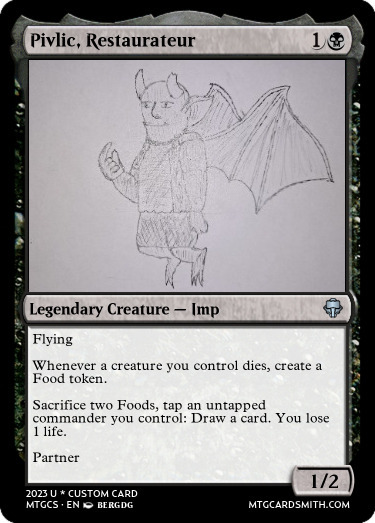

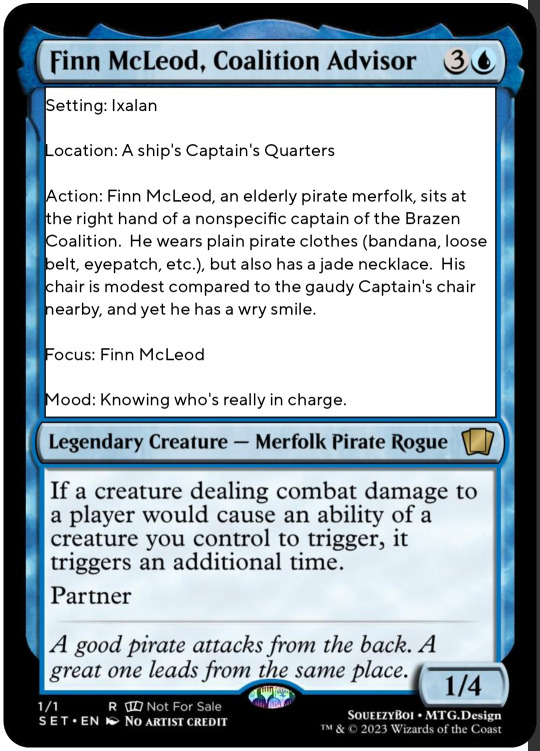
Eligible Bachelors - Hit Singles Winners
Bouquets and love letters to our winners this week: @bergdg, @grornt, and @squeezyboi!
Pivlic, Restaurateur - @bergdg
I think this card may just be the single most versatile entry submitted this week. With only three abilities you have successfully created a card that synergises with decks focused on flying creatures, dying creatures, artifact tokens, lifegain, and artifacts dying. Of those five, only lifegain doesn't really have an extant Partner commander that especially synergises with it (Ikra Shidiqi aside, perhaps). That you've managed to cover so much ground in so few lines while also constructing a card that just Makes Sense On Its Own impresses me to no end. Like, this very much does not look at all like you went down a checklist trying to find every possible synergy one could have with the extant partners, but you somehow managed that while constructing your impish small business owner, and I must applaud you for this. Although maybe it could cost like one more mana? I don't know, jury's still out there, honestly if anything I'm picking nits for the sake of it here. This card is delightful, and I must thank you for submitting it.
Hemir, the Earthdrover - @grornt
While there are certainly a few tribal elements among the extant list of potential partners, what stands out to me about this cards specifically is not how well it might work with *those* cards, necessarily, but also with just about every other printed partner. I adore how this card opens up space for one to take any arbitrary partner and turn that card into a potential general for a tribal deck, regardless of the actual specific abilities of the card in question. Have you ever considered running Tymna for a Cleric Tribal deck? Now, suddenly, with this particular friend in the picture, that idea doesn't sound quite as outlandish. I just really appreciate how much raw design space this card opens despite being relatively simple ability-wise. Well done.
Finn McLeod, Coalition Advisor - @squeezyboi
Finally, rounding things out for the week, we have this rather delightful saboteur doubler. While there aren't an astounding number of commanders with combat damage triggers to double in this particular card pool, the ones that are there are all unique enough in nature that I could easily see someone building a lot of potential decks with this guy. Your creature type selection definitely seems to acknowledge what the environment has to offer, as there are several Pirate tribal partners which all have some kind of saboteur effect, but I could easily see someone pairing this with the aforementioned Ikra for some kind of goofy high-toughness deck, or maybe even Sidar Kondo to take advantage of saboteurs with relatively low power. Plus, this is just generally a cool and unique effect that I'm honestly surprised they haven't done yet. While they've definitely gotten close with a couple of attack trigger doublers, saboteurs are a big enough staple of the game that I think they deserve a little bit of the limelight.
That'll be your winners this week. Runners will be up a bit later. There were a whole, whole lot of very strong entries this week, and honestly I can't thank you all enough for giving me so many cards to agonize over. Seriously, y'all are entirely too good at this.
-@starch255
#mtg#magic the gathering#Inventor's Fair#custom Magic card#mono-colored partner contest#commentary#winners
18 notes
·
View notes
Text
is there a good reason to play anything besides insect tribal? mantis god is overpowered obviously but even outside of that you have beehive synergy, combos like cockroach + ants + totem of your choice, ants in general. it just feels like the most mechanically dense animal to pick and the others feel at best situational, especially when insane damage output and comboability is right there, to the point of easy first turn wins
5 notes
·
View notes
Note
if wotc wants to do other were creatures (wererats, werebears, etc) is the lack of of a "were" creature type a problem since it means you can't do were tribal synergies and you'd either have to do a new creature type for each species or do it inconsistently?
So one of the things we tried we we experimented with the idea of Were as a creature type was to mock up cards and show them around. We made a few cards where the art was clearly a werewolf, but the word “Werewolf” wasn’t in the name.
The test didn’t go well. You’d think the space between Were and Wolf wouldn’t matter, but it did. My favorite response was on a card showing a bunch of Werewolves: “Okay, there were wolves. What are they now?”
The point of this story is if players don’t get the basic concept, it doesn’t matter what you could do with the design technology *if* they did get it.
56 notes
·
View notes
Note
what's your favorite magic deck / favorite format ??? I know you play and I'd love to hear more of your thoughts about the game !
generally speaking my history with magic has been very casual, played a bit at stores in high school during original innistrad (around that time anyways) and since have pretty much just focused on commander. recently i've been getting more interested in the more Real :tm: formats, Amulet Titan in Modern and Fires in Pioneer are probably my favorite decks from Real Formats :TM: that i've played so far.
other than that my staple commander deck is an orzhov cleric tribal list running Ravos & Tymna, cleric tribal is just neat as hell. great synergies with eachother, love edgewalker, love rotlung reanimator, love orah, love saccing a thousand clerics to ashnod's for the world's loudest debt to the deathless
(here's da list)
i feel the same way about magic that i do about dota. there are many lookalikes and wannabes, but nothing can possibly compare to The Classix. that said i don't pay for magic cards because A. i'm broke and B. why would you
6 notes
·
View notes